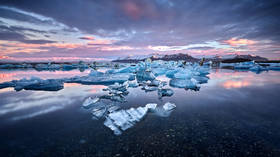'Mind-boggling for May’: Global warming continues to hit Russia hard as country records 30 degrees Celsius inside Arctic Circle

A Twitter post from a British meteorologist has gone viral after he detected “mind-boggling” temperatures within the Arctic Circle in Russia, where the thermometer last week hit 30°C, hotter than almost everywhere else in Europe.
Scott Duncan, a professional meteorologist based in London who designed the popular weather-forecasting website WXCHARTS, tweeted on May 19 that such temperatures are "truly exceptional for any time of the year," but even more shocking in the month of May.
"This part of the Arctic is 20-24°C hotter than average for this time of year," Duncan said.
It reached +30°C (86.5°F) in the Arctic today. Hotter than pretty much all of Europe right now.Truly exceptional for any time of the year but mind-boggling for May. More updates to follow. pic.twitter.com/2CTTykUW3F
— Scott Duncan (@ScottDuncanWX) May 19, 2021
The meteorologist went on to describe how, last week, most of Europe was colder than average, while the Russian north was simultaneously far hotter than normal mid-May temperatures.
In the last few years, Russia's Arctic has seen extreme swings in temperature. Last June saw the small town of Verkhoyansk in the region of Yakutia break the record for the highest temperature ever recorded within the Arctic Circle, hitting a maximum of 38 degrees Celsius.
🌡️🔥 T°max de 38.0°C à #Verkhoyansk, #Sibérie orientale (67.55°N), ce 20 juin.Si cette valeur est correcte, ce serait non seulement un record absolu à la station (37.3°C, 25/07/1988) mais aussi la température la plus élevée jamais observée au nord du cercle polaire #arctique ! pic.twitter.com/EUE8JVdkGR
— Etienne Kapikian (@EKMeteo) June 20, 2020
Verkhoyansk had already held the record for the greatest temperature range on Earth, having once hit -68 degrees during winter.
Russia 🇷🇺 has just broken its national heat record for the month of May. Nearly reaching +40°C (104°F) in Khasavyurt. Russia has one of the most extreme climate trends.H/t @WeatherSarov1, @EKMeteo & @extremetempspic.twitter.com/OKOiEXiLKU
— Scott Duncan (@ScottDuncanWX) May 23, 2021
It's not just Russia's Arctic that has seen temperatures increase in recent times. A few days after his post about the far north, Duncan revealed that Russia had broken its national heat record for May, with temperatures almost reaching 40°C in Khasavyurt, a city in the southern Republic of Dagestan.
Earlier this year, at his annual speech to the Federal Assembly, Russia's President Vladimir Putin announced that the country would adapt its industries to global warming and establish strict controls over harmful emissions. Putin has previously voiced his concern about the effect of climate change on Russia, noting that 65% of the country's territory is made up of permafrost, and any drastic change could have disastrous consequences for the economy.
If you like this story, share it with a friend!














